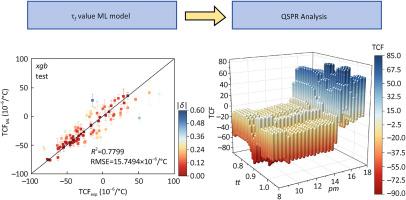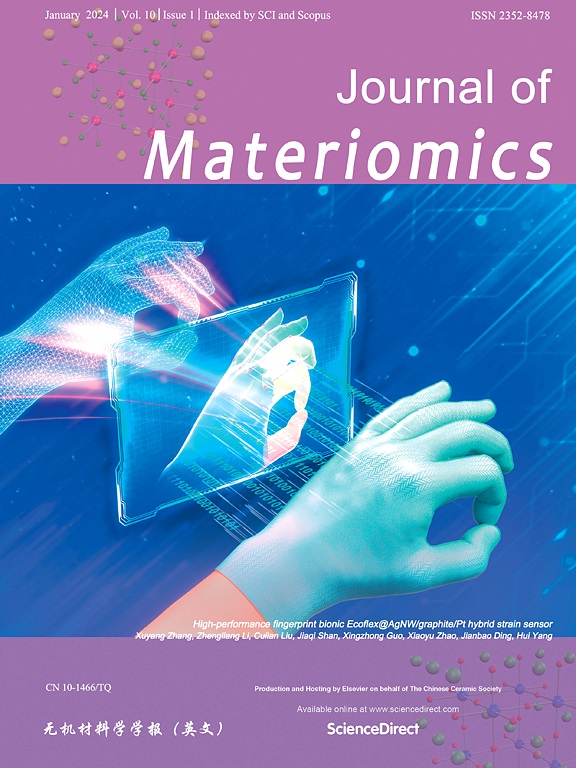机器学习辅助abo3型微波介质陶瓷的τf值预测
IF 9.6
1区 材料科学
Q1 CHEMISTRY, PHYSICAL
引用次数: 0
摘要
谐振频率温度系数τ (TCF)是评价微波介质陶瓷温度稳定性的关键参数。本文提出了一种预测abo3型微波介质陶瓷τf值的机器学习框架。利用104个单相abo3型化合物的精心整理的数据集,我们系统地评估了基于五种机器学习算法的模型,使用31个结构描述符作为输入特征。极端梯度增强(eXtreme Gradient Boosting, XGB)算法成为最优预测模型,在测试集上表现出鲁棒性(R2 = 0.7799, RMSE = 15.7494×10-6°C-1)。验证集上的一致结果进一步证实了其泛化能力。影响模型性能的关键特征包括分子介电极化率(pm)、容差系数(tt)、离子体积(Vi)和相对分子质量(m)。结构-性质关系研究表明,质点通过影响介电常数对τf值的调节起着重要作用。这些临界描述符的定量阈值也被导出,用于识别τf接近于零的材料。这项工作为加速发现具有良好温度稳定性的微波介质陶瓷提供了有效的数据驱动方法。本文章由计算机程序翻译,如有差异,请以英文原文为准。

Machine learning assisted τf value prediction of ABO3-type microwave dielectric ceramics
The temperature coefficient of resonance frequency (τf or TCF) is the key parameter for evaluating temperature stability of microwave dielectric ceramics. In this work, a machine learning framework was proposed to predict the τf values of ABO3-type microwave dielectric ceramics. Leveraging a curated dataset of 104 single-phase ABO3-type compounds, we systematically evaluated models based on five machine learning algorithms using 31 structural descriptors as input features. The eXtreme Gradient Boosting (XGB) algorithm emerged as the optimal predictive model, demonstrating robust performance on the test set (R2 = 0.7799, RMSE = 15.7494×10–6 °C–1). Consistent results on the validation set further confirmed its generalization capability. Critical features contributing to the model's performance include molecular dielectric polarizability (pm), tolerance factor (tt), ionic volume (Vi) and relative molecular mass (m). Structure-property relationship studies revealed that the pm plays an important role in modulating the τf value by affecting the permittivity. Quantitative thresholds for these critical descriptors were also derived for identifying materials with near-zero τf. This work provides an effective data-driven approach for accelerating the discovery of microwave dielectric ceramics with good temperature stability.
求助全文
通过发布文献求助,成功后即可免费获取论文全文。
去求助
来源期刊

Journal of Materiomics
Materials Science-Metals and Alloys
CiteScore
14.30
自引率
6.40%
发文量
331
审稿时长
37 days
期刊介绍:
The Journal of Materiomics is a peer-reviewed open-access journal that aims to serve as a forum for the continuous dissemination of research within the field of materials science. It particularly emphasizes systematic studies on the relationships between composition, processing, structure, property, and performance of advanced materials. The journal is supported by the Chinese Ceramic Society and is indexed in SCIE and Scopus. It is commonly referred to as J Materiomics.
 求助内容:
求助内容: 应助结果提醒方式:
应助结果提醒方式:


